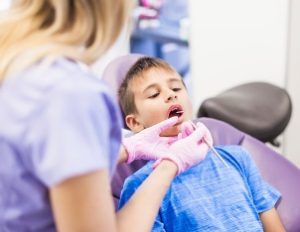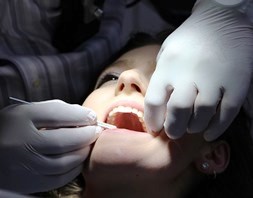Dental Hygiene Degree Programs
How to Pick the Right One Near Princeton New Jersey
 Selecting the right dental hygienist program near Princeton NJ is an essential first step toward launching your new career in dentistry. But prior to making your selection, you must assess and compare your school options. Picking the school with the least expensive tuition or enrolling in the college that is closest to your home is not the right way to come to a decision. A dentistry program's accreditation and reputation are also crucial factors and must be taken into account as well. Dental hygienists generally earn an Associate Degree, as compared to a certificate usually earned by assistants, and can take anywhere from two to three years to accomplish. And therefore there is more expense associated with the lengthier training of a hygienist as compared to an assistant. We will talk about all of these considerations and additional questions that you need to be asking the dental hygienist schools you are assessing later in this article. But first, let's review the roles of dental hygienists and the training programs offered.
Selecting the right dental hygienist program near Princeton NJ is an essential first step toward launching your new career in dentistry. But prior to making your selection, you must assess and compare your school options. Picking the school with the least expensive tuition or enrolling in the college that is closest to your home is not the right way to come to a decision. A dentistry program's accreditation and reputation are also crucial factors and must be taken into account as well. Dental hygienists generally earn an Associate Degree, as compared to a certificate usually earned by assistants, and can take anywhere from two to three years to accomplish. And therefore there is more expense associated with the lengthier training of a hygienist as compared to an assistant. We will talk about all of these considerations and additional questions that you need to be asking the dental hygienist schools you are assessing later in this article. But first, let's review the roles of dental hygienists and the training programs offered.
It Takes Just a Few Minutes to Start Your Dental Hygienist Career Below
Dental Hygienist Job Description

When contrasting the duties of a dental hygienist to that of an assistant, the main difference is undoubtedly that the hygienist works more independently. Dental assistants work with and assists the Princeton NJ dentists and the practice. Hygienists, while also supporting the practice, work with the patients more on an individual basis. They are often the initial person a patient interacts with when called from the waiting room. They examine every patient's gums and teeth and present their findings to the dentists. They may also carry out basic procedures. Depending on state law, a hygienist's duties can include:
- Removing plaque, tartar and stains
- Administering fluoride treatments
- Polishing teeth and applying sealants
- Instructing patients regarding oral hygiene
- Taking and developing X-rays
- Applying fillings and removing sutures
Dental Hygienist Education Options
Due to the added responsibility as compared to an assistant, dental hygienists working in Princeton NJ dental practices are often required to have an Associate Degree in dental hygiene rather than a certificate. These programs can take anywhere from 2 to as long as 3 years to complete and must be accredited by the CDA in almost every state. They are offered in community colleges as well as trade and technical schools. And in addition to classroom studies learning the fundamentals of dental hygiene, there will be a clinical aspect to the training as well. A number of programs also offer internships with local dentists or dental practices.Online Dental Hygienist Classes
 Enrolling in an online dental hygienist program might be a great alternative for receiving your education. Just remember that the program will not be 100% online, since there will be a practical component to your training. But the remainder of your classes will be available by means of your personal computer in the comfort of your Princeton NJ home or anywhere else on your tablet or laptop. For those working while going to college, online dental programs make education far more obtainable. Some may even charge lower tuition costs than their traditional counterparts. And added expenses such as for commuting, books and school supplies may be reduced also. The clinical training can typically be completed at an area dental practice or in an on-campus lab. With both the clinical and online training, everything required to get the appropriate education is furnished. If you have the dedication for this mode of education, you may find that attending an online dental hygienist program is the ideal choice for you.
Enrolling in an online dental hygienist program might be a great alternative for receiving your education. Just remember that the program will not be 100% online, since there will be a practical component to your training. But the remainder of your classes will be available by means of your personal computer in the comfort of your Princeton NJ home or anywhere else on your tablet or laptop. For those working while going to college, online dental programs make education far more obtainable. Some may even charge lower tuition costs than their traditional counterparts. And added expenses such as for commuting, books and school supplies may be reduced also. The clinical training can typically be completed at an area dental practice or in an on-campus lab. With both the clinical and online training, everything required to get the appropriate education is furnished. If you have the dedication for this mode of education, you may find that attending an online dental hygienist program is the ideal choice for you.
What to Cover With Dental Hygienist Schools
Now that you have decided to become a dental hygienist in Princeton NJ, you can begin the process of comparing programs and schools. As we covered at the start of this article, a number of prospective students start by checking out the location and the cost of the colleges. Maybe they search for some online alternatives as well. Even though these may be relevant initial points to consider, there are several additional questions that you should address to the schools you are looking at in order to arrive at an informed decision. Toward that end, we have furnished a list of questions to assist you with your due diligence and final selection of the best dental hygienist school for you.
Is the Dental Program Accredited? There are many important reasons why you should only choose an accredited dental hygienist program. If you are going to become certified or licensed, then accreditation is a requirement in almost all states. In order to take the National Board Dental Hygiene Exam, your dental program must be accredited by the Commission on Dental Accreditation (CDA). Accreditation also helps ensure that the instruction you get is comprehensive and of the highest quality. Princeton NJ employers typically prefer or require that new hires are graduates of accredited colleges. And finally, if you are requesting a student loan or financial aid, often they are not offered for non-accredited programs.
Is Enough Practical Training Provided? Clinical or practical training is a necessary component of every dental training program. This holds true for the online college options as well. A number of dental hygienist colleges have partnerships with local dental offices and clinics that provide clinical training for their students. It's not only essential that the college you select offers enough clinical hours but also provides them in the kind of practice that you ultimately would like to work in. For example, if you have an interest in a career in pediatric dentistry, check that the college you enroll in offers clinical rotation in a local Princeton NJ dental practice that focuses on dental care for children.
Is There an Internship Program? Verify if the dental colleges you are looking at sponsor internship programs. Internships are undoubtedly the most effective way to get hands-on, clinical experience in a professional dental practice. They make it easier for students to transition from the theoretical to the practical. They can also help students form working relationships in the professional dental community. And they are attractive on resumes also.
Is Job Placement Support Provided? Many graduating students of dental hygienist schools need help landing their first job. Find out if the programs you are considering have job placement programs, and what their job placement rates are. Schools with high job placement rates are likely to have good reputations within the Princeton NJ dental profession in addition to extensive networks of contacts where they can refer their students for internships or employment.
Are Classes Smaller? Find out from the colleges you are reviewing how large typically their classrooms are. The smaller classes usually provide a more personal environment for training where students have increased access to the instructors. Conversely, larger classes often are impersonal and provide little individualized instruction. If feasible, ask if you can sit in on a couple of classes at the Princeton NJ dental hygienist school that you are leaning toward in order to witness first hand the level of interaction between students and instructors before enrolling.
What is the Total Expense of the Program? Dental hygiene training can differ in cost depending on the duration of the program and the amount of clinical training provided. Other variables, such as the reputations of the colleges and whether they are public or private also come into play. But along with the tuition there are other significant costs which can add up. They can include expenses for such things as commuting and textbooks as well as school materials, equipment and supplies. So when comparing the cost of colleges, don't forget to add all of the expenses associated with your education. Most colleges have financial assistance departments, so be sure to find out what is available as far as grants, loans and scholarships in the Princeton NJ area.
Are the Classes Accessible? Before selecting a dental hygienist college, you need to verify that the hygienist or assistant program offers classes that suit your schedule. This is particularly true if you will be working while receiving your education and need to go to classes near Princeton NJ at nights or on weekends. And even if you choose an online program, you will still be required to schedule your practical training classes. Also, while addressing your concerns, ask what the make-up policy is if you should have to miss any classes due to illness, work or family responsibilities.
Find Out More About Training to Become a Dental Hygienist in Princeton
Pick the Best Princeton Dental Hygienist School
Choosing the right dental hygienist course is essential if you wish to take the National Board Dental Hygiene exam or, if required in your state, become licensed. As we have covered, there are several options offered to obtain your education and it takes a fairly short period of time to become a dental hygienist. You can acquire your formal education through dental hygienist programs at junior colleges, technical institutes, trade schools and vocational schools. Graduates of these schools normally obtain an Associate Degree. Dental Hygienists generally require about two years of studies before they enter the work force. When pursuing a degree you can choose to go to classes online or on-campus. Whichever mode of training you choose to pursue, by asking the questions presented in this article you will be better prepared to make the right selection. And as a result, you will be ready to begin your journey toward becoming a dental hygienist in Princeton New Jersey.
Princeton Dental Hygienist Programs Near Me | Princeton Dental Hygienist Degree
